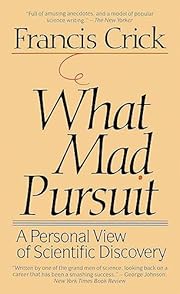

Pulse en una miniatura para ir a Google Books.
|
Cargando... Qué loco propósito (1988)por Francis Crick
 Ninguno Actualmente no hay Conversaciones sobre este libro.   ) )An Extraordinary Journey Dr. Crick shares with the readers his personal journey of scientific discovery. Starting with how he chose molecular biology as his pursuit, the "gossip test -- what you are really interested in is what you gossip about", leading up to the discovery of structure of DNA and the genetic code, and eventually the study of neurobiology when he passed 60, "at my time of life I had a right to do things for my own amusement". Dr. Crick's intelligence and great sense of humor shines throughout. It's a rare, insightful book that is both entertaining and intellectually stimulating, with many amusing anecdotes and characters. For example, at one point he had to extract enzymes from his own tears and even thought of testing his two-year-old daughter's tears, but "was sternly forbidden to attempt it" by his wife. Mad pursuit indeed. The Eureka Moment "It is not easy to convey, unless one has experienced it, the dramatic feeling of sudden enlightenment that floods the mind when the right idea finally clicks into place. One immediately sees how many previously puzzling facts are neatly explained by the new hypothesis. One could kick oneself for not having the idea earlier, it now seems so obvious. Yet before, everything was in a fog." (Read full review at Nemo's Library) This reading was one of the most fun I have had looking through the muse of a disciplined scientist. His re-telling of his modest beginnings, through his and his team discovering the DNA molecule and further, was nothing less than charming. His humors are attractive in so many ways, on the verge of irreverence, tipping the scales on self deprecation, the roasting of oneself comes to mind; yet beautifully dignified all the way through. Coming from one of the primary contributers to the discovery of DNA, being a scientific marvel of the twentieth century, this book is a sweetheart of all sweethearts. God bless Francis Crick. “What Mad Pursuit”, the autobiography of Francis Crick – Co-discoverer of the double helical structure of DNA. This one provides a bit of a contrast to Watson's recollections of the discovery and his autobiography, as Crick comes across as a milder personality, albeit with no less ambition and intelligence. The most interesting parts of this book seem to be Cricks views on science, how it should be done, and what are the best parts of it, and this is something in common with Watson's “Avoid Boring People”, which was also interesting on account of it detailing the authors opinions. A part of this book covers the science of the discovery, and what was found out after the discovery, and musings on evolution, but these will only be of much interest to a non-scientist, as most scientists will know it all inside out by now. Though perhaps the experimental technique – how they got where they did, would still be interesting, as it is always informative to see inside the minds of the men who made the great discoveries. Also, it is interesting and encouraging to see how they went wrong along the way, and such pieces of advice as not to hang onto theories that aren't working, and to try something else, may seem common sense, but in reality do hold up the advances that could have been made sooner otherwise. The latter part of the book moves onto the scientific interests of Crick in later life, which include the mind, and perception, and though he didn't contribute greatly to this field, he still shows a competence of knowledge in understanding how progress should be sought. Overall this was a good read, and one which probably warrants more attention than it receives. sin reseñas | añadir una reseña
Aparece abreviada en
Candid, provocative, and disarming, this is the widely-praised memoir of the co-discoverer of the double helix of DNA. No se han encontrado descripciones de biblioteca. |
Debates activosNingunoCubiertas populares
 Google Books — Cargando... Google Books — Cargando...GénerosSistema Decimal Melvil (DDC)574.1910924Natural sciences and mathematics Life Sciences, Biology Biology Physiology & Biochemistry Biophysics and Biochemistry BiophysicsClasificación de la Biblioteca del CongresoValoraciónPromedio: (3.67) (3.67)
¿Eres tú?Conviértete en un Autor de LibraryThing. |
||||||||||||||||||||||||||||||||||||||||||||||||||||||||||||||||||||||||||||||||||||||||||||||||||||||||||||||||||||||||